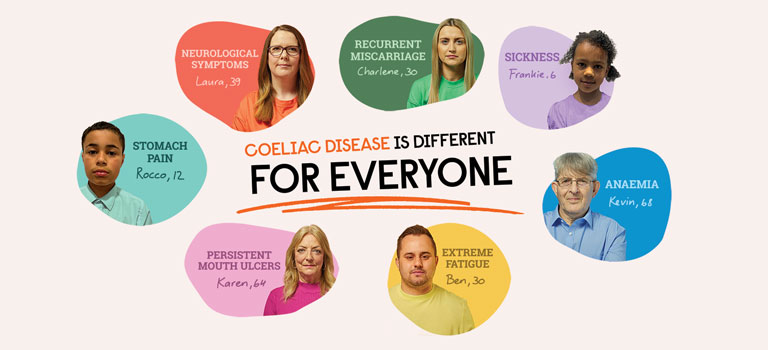Do I have coeliac disease?
What is coeliac disease?
Coeliac disease is an autoimmune condition affecting 1 in 100 people in the UK. Currently only 36% of them are medically diagnosed leaving an estimated 500,000 living with undiagnosed coeliac disease and the risk of developing long term health complications.
Coeliac disease is a serious illness where the body’s immune system attacks its own tissues when you eat gluten. This causes damage to the lining of the gut and means the body can’t properly absorb nutrients from food.
Our community share their stories and experiences
Our awareness campaign ‘coeliac disease is different for everyone’ aims to speed up the path to diagnosis by highlighting the varied symptoms of coeliac disease and encourage people to take our self-assessment to see if they should be tested.
We’d like to thank Laura, Karen, Ben, Charlene, Kevin, Rocco, Hilary, Frankie and Nicola for sharing their stories to support our awareness campaign.
You can view their videos here and if you’d like to share your story to help others too, we’d love to hear from you.
Find out more about symptoms
The symptoms of undiagnosed coeliac disease are wide ranging and people can experience one or several at the same time, or in some cases they may even be asymptomatic. As these symptoms could also be signs of other conditions, we recommend taking our self-assessment to see if it could be coeliac disease.
- severe or occasional diarrhoea, excessive wind and/or constipation
- persistent or unexplained nausea and vomiting
- recurrent stomach pain, cramping or bloating
- any combination of iron, vitamin B12 or folic acid deficiency
- anaemia
- tiredness
- sudden or unexpected weight loss (but not in all cases)
- mouth ulcers
- skin rash (dermatitis herpetiformis)
- tooth enamel problems
- liver abnormalities
- unexplained subfertility
- repeated miscarriages
- neurological (nerve) problems such as ataxia (loss of coordination, poor balance) and peripheral neuropathy (numbness and tingling in the hands and feet)
Getting diagnosed
The first step to diagnosis is to visit your GP to discuss your symptoms and if relevant to get a simple blood test. Our self-assessment test is based on the NICE guidelines for diagnosis of coeliac disease, and at the end of the online assessment you will be emailed your results which may recommend that you be tested – you can share this with your GP at your appointment.
For more information about getting diagnosed or specific information relating to coeliac disease in children, find out more here.
Please note you must ensure you’re consuming gluten throughout the testing process to receive an accurate test.
